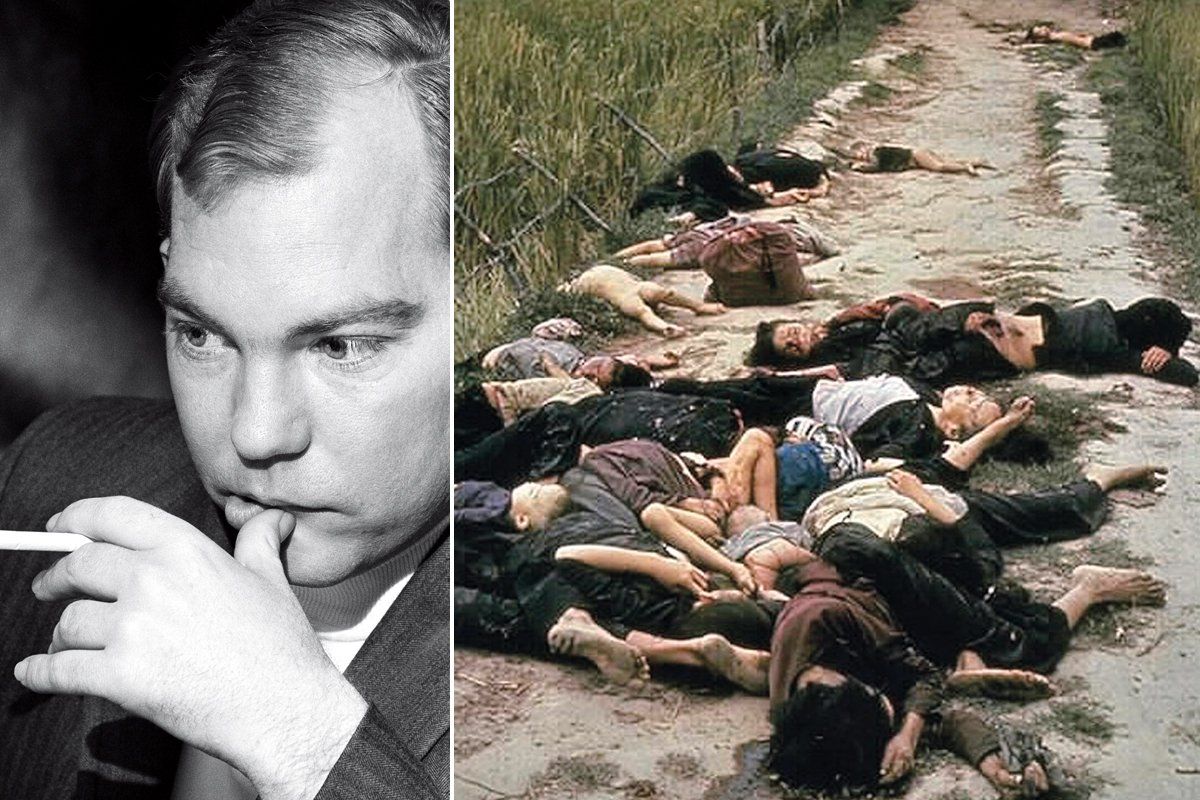
On March 16, 1968, two platoons of American soldiers arrived at the hamlet of My Lai, in the district known as Son My in what was then South Vietnam. The men were from Charlie Company of the First Battalion, 20th Infantry Regiment, 11th Brigade, 23rd Infantry Division, and they were on a search-and-destroy mission. They entered the village around 8 in the morning. Several hours later, between 300 and 500 villagers lay dead.
Just how the massacre started has never been precisely determined, but the details were horrific. Eyewitnesses described bayonetings, clubbings, and close-range shootings, all without a single shot being fired at the Americans. Many of the dead were women, children, and the elderly. Some were killed while kneeling in prayer. Some were found with "C Company" carved into their flesh. The men of Charlie Company had been in Vietnam all of three months.
The My Lai massacre is commonly called a turning point in American support for the war. It wasn't. By the time journalist Seymour Hersh broke the story in the fall of 1969, the military investigation was well underway. The only individual actually convicted was Lt. William Calley, who commanded the men of Charlie Company. At home his conviction was unpopular. Private White House polling discovered that four out of five Americans wanted him released.
Support for the war, as John E. Mueller points out in his 1973 book, "War, Presidents and Public Opinion," had already begun to drop a bit, especially among the less educated. After the massacre became known, public support actually increased. At the time of the massacre, American ground forces had been in Vietnam for three years. The killings at Kent State, which would galvanize antiwar forces, were still to come.
Echoes of Atrocity: Fast-forward 40-odd years. The recent shooting rampage by an American soldier in Afghanistan's southern Kandahar province, which left 16 dead, has drawn inevitable comparisons to My Lai. But this recent crime, horrible though it may be, was different. For one thing, it was allegedly the act of an individual, Army Staff Sgt. Robert Bales. At My Lai, two platoons participated in the killing. The men of Charlie Company said later that they were doing what Calley had ordered, ridding the hamlet of Viet Cong. (Even children, Calley said at his trial, had been throwing hand grenades.)
But there is a larger difference. America has changed, especially in our attitudes toward those on our own side who commit outrages while serving in uniform. There are atrocities in every conflict, and for most of history too little was made of ours. Our instinct had been to sweep them under the rug, lest they distract from the larger cause at stake. My Lai mercifully put an end to that habit.

Lieutenant Calley was sentenced to life in prison—an appropriate punishment for a man who had personally herded villagers into a ditch and shot them. But the sentence was later reduced to 20 years, then to 10. Calley was finally released after three and a half years of house arrest.
Nobody imagines that a similarly lenient fate awaits Sergeant Bales. Just look at the aftermath of the abuses of prisoners at Abu Ghraib in Iraq. Several reservists of the 372nd Military Police Company received prison sentences, and Cpl. Charles A. Graner Jr. was sent to jail for 10 years. He was released after serving six and a half, all at the United States Disciplinary Barracks at Leavenworth, Kan., where Calley was supposed to serve his life sentence.
Service With Honor: And it is important not to paint with too broad a brush. At the time of the massacre, more than a million Americans had served or were serving tours of duty in Vietnam. Everybody knew someone who had been there. Even with the 2006 declassification of Defense Department files on dozens of additional incidents in the course of the war, it would be absurd to draw from the inexcusable crimes of a few some larger truth about America, its armed forces, or its view of the world. The same is true of our more recent wars, in Afghanistan and Iraq.

Nearly all of our military forces serve with enormous honor and courage. It bears mention that at Abu Ghraib, just as at My Lai, it was fellow soldiers who blew the whistle on the perpetrators. In 1998 two American servicemen were awarded the Soldier's Medal for their actions in protecting civilians at My Lai. One of the recipients, a military-helicopter pilot who landed his craft between the killers and their potential victims, quoted Gen. Douglas MacArthur: "The soldier, be he friend or foe, is charged with the protection of the weak and the unarmed."
Uncommon Knowledge
Newsweek is committed to challenging conventional wisdom and finding connections in the search for common ground.
Newsweek is committed to challenging conventional wisdom and finding connections in the search for common ground.
About the writer
To read how Newsweek uses AI as a newsroom tool, Click here.






